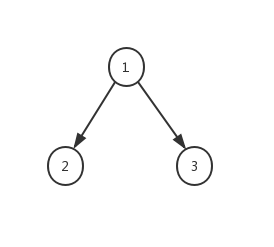Google:
Given the root to a binary tree, implement serialize(root),
which serialize the tree into a string, and deserialize(s), which deserialize the string back into the tree.
For example, given the following Node class
class Node:
def __int__(self, val, left=None, right=None)
self.val = val
self.left = left
self.right = right
The following test should pass:
node = Node('root', Node('left', Node('left.left')), Node('right'))
assert deserialize(serialize(node)).left.left.val == 'left.left'
分析:所有的二叉树的题,都要利用递归的思想来解。
这个题难就难在如何巧妙的找到二叉树正确的序列化表示。
栈/函数调用 ,二叉树 -->递归, 想到这里,我不由得想到了计算器。计算器输入的其实就是一串字符串,然后输出结果,对于复杂的结合律,不就是通过栈/树来解决的吗?那这里为什么不能沿用它的思想呢?
树的两个左右子树不就是操作符的两个操作数吗?
对于以下的这颗树:

用()表示结点的子树,空格表示元素之间的分隔,那么,用 1 (2 () ()) (3 () ()), 我们完全可以用这种表示来表达一个树。为了简化起见,我们将空的子树()转化成 #, 那么二叉树就被简化成 1 2 # # 3 # #.
好,那如何重新变成二叉树呢?
1 2 # # 3 # #
deserialize同样需要递归,那么如何设计这个递归函数呢?输入是字符串,返回则是树的结点。
算法逻辑:
对于该字符串,如果找到的第一个元素是#, 直接返回空,并将字符串关于#的那部分裁掉。若不是#,则新建一个结点,将元素的值存储到这个结点上,并对剩余的字符串递归调用生成该结点的左子树和右子树。
同样,代码附上,以供参考:
#include <iostream>
#include <string>
class BinaryTree
{
public:
BinaryTree(std::string val, BinaryTree *left = nullptr, BinaryTree *right = nullptr)
{
this->val = val;
this->left = left;
this->right = right;
}
~BinaryTree()
{
delete this->left;
delete this->right;
}
std::string serialize()
{
std::string retVal = this->val;
retVal += this->left ? (" " + this->left->serialize()) : " #";
retVal += this->right ? (" " + this->right->serialize()) : " #";
return retVal;
}
BinaryTree* deserialize(std::string& val)
{
if(val.empty())
return nullptr;
BinaryTree *retVal = new BinaryTree("");
int pos = 0;
pos = val.find_first_of(" ", pos);
std::string element = val.substr(0, pos);
val = val.substr(pos+1, val.length() -pos -1);
if(element == "#")
return nullptr;
retVal->val = element;
retVal->left = deserialize(val);
retVal->right = deserialize(val);
return retVal;
}
private:
std::string val;
BinaryTree* left = nullptr;
BinaryTree* right = nullptr;
};
int main()
{
BinaryTree *biTree = new BinaryTree("1", new BinaryTree("2"), new BinaryTree("3"));
std::string encodedBinaryTree = biTree->serialize();
std::cout << "serialize: " + encodedBinaryTree << std::endl;
BinaryTree * deBiTree = biTree->deserialize(encodedBinaryTree);
std::cout << "serialize deserialized: " + deBiTree->serialize() << std::endl;
delete biTree;
delete deBiTree;
return 0;
}





 博客围绕二叉树的序列化与反序列化展开。指出利用递归思想解题,借鉴计算器思路,用特定表示法将二叉树简化为字符串,如 1 2 # # 3 # #。还阐述了反序列化的递归算法逻辑,即根据字符串元素情况生成树的结点。
博客围绕二叉树的序列化与反序列化展开。指出利用递归思想解题,借鉴计算器思路,用特定表示法将二叉树简化为字符串,如 1 2 # # 3 # #。还阐述了反序列化的递归算法逻辑,即根据字符串元素情况生成树的结点。
















 223
223

 被折叠的 条评论
为什么被折叠?
被折叠的 条评论
为什么被折叠?








